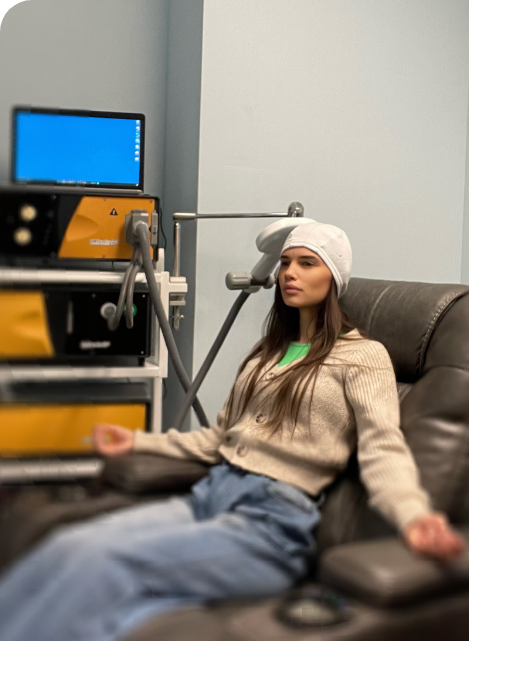If you have been told you have treatment-resistant...Read More
Transformative Care for Mind and Life
At Village TMS in Manhattan, we are redefining modern mental health care by integrating scientific precision with compassionate expertise. Our Transcranial Magnetic Stimulation (TMS) therapy offers a proven breakthrough for individuals who have not found relief through traditional medication. Located in central New York City, this non-invasive treatment targets key brain regions to improve focus, mood, and overall well-being without surgery or downtime.
TMS therapy is FDA-approved for major depressive disorder, OCD, substance abuse, and anxiety, and research now supports its potential benefits for attention-deficit/hyperactivity disorder (ADHD). For individuals seeking alternatives to medication or experiencing unwanted side effects, TMS for ADHD helps restore balance by stimulating underactive brain areas responsible for attention and impulse control. Studies in the United States and abroad demonstrate measurable improvements in ADHD symptoms, executive function, and working memory when TMS therapy is integrated into comprehensive ADHD treatment plans.


During treatment, a magnetic coil delivers gentle pulses to the prefrontal cortex, a brain region that regulates mood and concentration. Each session’s stimulation protocol is personalized to your motor threshold, ensuring accurate targeting without affecting other brain areas. These TMS pulses reawaken neural networks linked to focus, emotional balance, and processing speed, helping patients experience measurable symptom improvement over time. Using advanced navigation tools, our healthcare providers ensure every session achieves the highest level of precision and comfort.
Get help with depression today! It’s important to know that you are not alone.
Extensive clinical research continues to confirm TMS therapy’s effectiveness across multiple mental health conditions. Controlled TMS studies published on ClinicalTrials.gov and reviewed by the Food and Drug Administration show consistent results for treatment-resistant depression and promising findings for ADHD treatment, anxiety disorders, bipolar disorder, and post-traumatic stress disorder.
Research suggests TMS therapy may enhance response inhibition and improve attention regulation in ADHD patients. Ongoing fMRI studies continue to analyze brain activity, effect size, and outcome measures across various control groups.
Session Experience: Relax in a cozy chair while the device emits a light tapping sensation. Most patients read, listen to music, or meditate during the 20-minute session.
Treatment Schedule: A typical TMS treatment course includes five sessions per week for four to six weeks. Notice increased focus, energy, and mood stability within three weeks.
Long-Term Results: More than half of ADHD patients and individuals with other health conditions maintain improvements for a year or longer.
TMS therapy is one of the safest treatment options available. Temporary side effects such as mild headaches or scalp discomfort tend to fade quickly. Our New York City clinic follows strict safety guidelines and continuous monitoring by experienced healthcare providers. Each stimulation session is delivered with clinical precision to maintain comfort and maximize treatment outcome reliability.
While TMS therapy is best known for treating depression, its clinical potential continues to grow. Research indicates positive effects for ADHD, OCD, anxiety disorders, chronic pain, and mood regulation issues. Emerging TMS studies also show promise in improving brain function and brain networks related to cognitive flexibility and emotional stability.
Personalized Protocols: Each patient’s brain mapping informs individualized treatment strategies and stimulation protocols designed for optimal outcomes.
Expert Collaboration: Psychiatrists and therapists collaborate to optimize your ADHD management and broader wellness goals.
Holistic Support: Guidance with lifestyle changes, stress management, and nutrition to enhance overall recovery.

Evidence-Based Expertise: Our clinicians follow the latest TMS research and treatment protocols validated by global studies and review articles.
Comprehensive Support: We assess ADHD diagnosis, coexisting anxiety disorders, and other risk factors to deliver an integrated treatment method that addresses the root causes of symptoms.
Patient-Centered Excellence: Every individual receives attentive care, clear communication, and a dedicated treatment plan focused on long-term recovery and measurable success.
Patient-Centric Focus: Emphasizes comfort, convenience, and long-term wellness.
Expanded Conditions: Highlights TMS for OCD, PTSD, and chronic pain.
Success Metrics: Integrates data on improvement rates and longevity of results.
Safety Reassurance: Details protocols and side effect management.
Financial Clarity: Addresses insurance and support options.
Unique Clinic Value: Showcases personalized technology and holistic care.
This rewrite offers a fresh narrative, deeper insights, and answers to unspoken patient questions while maintaining an uplifting, empowering tone.
If you have been told you have treatment-resistant...Read More
If you have tried antidepressants, adjusted the dosage,...Read More
If you are exploring Transcranial Magnetic Stimulation as...Read More
Finding reliable TMS providers near me is no...Read More
Living with attention challenges affects more than focus....Read More
When you type “TMS near me” into Google,...Read More
Take this next step, we’ll help with the others.
We proudly serve patients throughout:
Manhattan: Union Square, Chelsea, Flatiron, Greenwich Village, West Village, East Village, Midtown, Upper East Side, Upper West Side, Harlem, Tribeca, SoHo
Brooklyn & Queens: Brooklyn Heights, Williamsburg, Park Slope, Long Island City, Astoria, Forest Hills
New Jersey: Hoboken, Jersey City, Weehawken, West New York, North Bergen, Fort Lee, Edgewater, Secaucus, Newark, and surrounding South Bergen communities
If you’re searching for TMS therapy near Manhattan, Brooklyn, Queens, or Hoboken, our centrally located NYC office makes treatment convenient and accessible.
TMS therapy is a non-invasive brain stimulation therapy that uses magnetic pulses to activate underperforming brain regions. These targeted pulses help improve attention, impulse control, and mood regulation without medication or downtime.
Yes. TMS for ADHD targets the prefrontal cortex to improve focus, processing speed, and executive function. Clinical data from TMS studies show measurable improvements in ADHD symptoms among patients resistant to conventional treatment methods.
Most patients experience only minor side effects such as scalp discomfort or mild headaches. These effects are temporary and generally subside within a few hours of treatment.
Many patients report noticeable symptom relief after two to three weeks of therapy. Over time, working memory and focus continue to improve as the brain adjusts to enhanced neural activity.
Yes. TMS therapy is approved by the Food and Drug Administration for depression and is supported by ongoing research for ADHD, bipolar disorder, and related conditions. It is widely recognized as a safe and effective treatment option by the American Psychiatric Association.
We use cookies to improve your experience on our site. By using our site, you consent to cookies.
Manage your cookie preferences below:
Essential cookies enable basic functions and are necessary for the proper function of the website.
These cookies are needed for adding comments on this website.
Google reCAPTCHA helps protect websites from spam and abuse by verifying user interactions through challenges.
Google Tag Manager simplifies the management of marketing tags on your website without code changes.
You can find more information in our Cookie Policy and Privacy Policy.